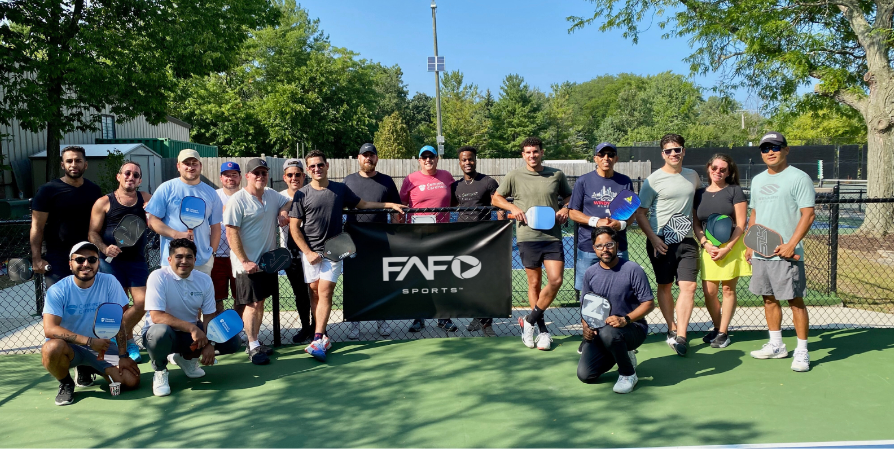
How Pickleball Builds Stronger Communities
Share
How Pickleball Builds Stronger Communities: Beyond Fitness, It's About Connection and Belonging
Pickleball is more than just a sport; it is a catalyst for stronger communities. While the fast-paced, low-impact game has gained popularity due to its health benefits, it also plays an essential role in bringing people together. The unique ability of pickleball to foster connection and create a sense of belonging extends far beyond the court. As the sport continues to spread, it is transforming neighborhoods into vibrant, engaged communities. But how exactly does pickleball achieve this? Let's delve deeper into how this sport fosters community bonds, inclusion, and belonging.
Pickleball: A Sport for All Ages and Skill Levels
One of the key reasons pickleball has the power to build stronger communities is its inclusiveness. Unlike many sports that cater to specific age groups or require high levels of athleticism, pickleball welcomes players of all ages and abilities. The game’s simple rules and manageable court size make it accessible to both beginners and seasoned athletes. Whether you're a teenager looking for a fun recreational activity or a senior citizen seeking low-impact exercise, pickleball offers something for everyone.
This inclusivity is a significant factor in the sport's ability to foster connections between diverse groups of people. When community members who may not typically cross paths come together on the court, they have an opportunity to interact, share stories, and form bonds. Multigenerational play is common in pickleball, which strengthens family relationships and encourages respect and understanding across age groups. By making physical activity fun and accessible, pickleball promotes a sense of belonging and unity among players of all backgrounds.

Breaking Down Social Barriers Through Pickleball
Pickleball has the unique ability to break down social barriers. In a world where people often stick to their social circles, pickleball provides an opportunity for individuals from different backgrounds to connect. When players step onto the court, their differences—whether cultural, social, or economic—fade into the background. The game becomes a common ground where people focus on collaboration, strategy, and fun.
Local pickleball tournaments and leagues further enhance this sense of unity. They allow community members to come together and support one another, whether they’re playing or cheering from the sidelines. Such events often evolve into social gatherings where friendships are formed, and communities become closer-knit. These connections extend beyond the court, helping to create a supportive, inclusive atmosphere in neighborhoods and towns.

Pickleball Promotes Physical and Mental Wellness
Physical wellness is often seen as the main benefit of participating in sports, but pickleball goes beyond that. The social interactions it facilitates contribute significantly to mental well-being. Studies have shown that social connectedness plays a crucial role in reducing stress, anxiety, and depression. By engaging in regular pickleball games, players not only improve their physical health but also enhance their emotional resilience and overall quality of life.
For many people, isolation and loneliness are major issues, especially in today’s fast-paced world. Pickleball offers an antidote to this by creating opportunities for face-to-face interactions in a relaxed and enjoyable setting. The camaraderie built on the court often leads to friendships that extend outside of the game, providing individuals with a support system that is vital for mental health. The sport becomes a way to combat loneliness, build community, and foster emotional well-being.
Building Community Identity and Civic Pride
Pickleball courts often become the heart of a community. In some towns, new pickleball facilities have been constructed as a way to revitalize public spaces and encourage social interaction. These courts act as community hubs, bringing together residents of all ages to play, socialize, and engage in healthy competition. The establishment of dedicated pickleball facilities can also inspire civic pride, as the sport becomes a source of local identity and a rallying point for community activities.
Furthermore, pickleball clubs and organizations are emerging as essential elements of community life. These clubs not only organize matches and tournaments but also engage in philanthropic activities such as charity events and community service projects. As a result, pickleball becomes more than just a game—it becomes a vehicle for positive change, helping to strengthen the social fabric of neighborhoods and fostering a collective sense of purpose and pride.
Pickleball as a Tool for Bridging Generational Gaps
Generational divides are a common challenge in modern communities. The fast pace of technological change and cultural shifts can sometimes create disconnects between younger and older generations. Pickleball, with its appeal to people of all ages, serves as a bridge between these generations. Whether it’s grandparents playing with their grandchildren or younger players teaming up with older neighbors, pickleball creates a unique space for intergenerational connection.
These interactions are beneficial for both younger and older participants. Younger players gain wisdom and life lessons from older generations, while older players stay engaged, active, and socially connected. The sense of mutual respect and understanding that develops through shared experiences on the court helps to break down stereotypes and build lasting relationships. Communities that embrace pickleball are often more cohesive and inclusive as a result.

Conclusion: Pickleball—A Cornerstone of Stronger Communities
At FAFO Sports, we're committed to helping communities thrive through the power of pickleball—because fitness isn't just physical, it's social. Pickleball is much more than a game, it is a powerful tool for community building. Through its accessibility, inclusivity, and ability to foster connections across generations and social divides, pickleball creates a sense of belonging that is essential for strong, vibrant communities. As more people take up the paddle and step onto the court, the ripple effects are felt throughout neighborhoods and towns. The bonds formed through pickleball extend far beyond the game, strengthening the social fabric and enhancing the quality of life for all involved.
Join the FAFO Sports community and experience how pickleball builds friendships, encourages collaboration, and promotes a sense of belonging that lasts long after the game is over.
Follow us on
Instagram
Facebook
Tiktok

1 comment
I started playing three years ago shortly after my divorce. At the time I was lonely, lost and had gain weight due to the stress of the situation. Three years later, I have made a world of new friends through pickleball and I am back to a size 6. Life is all the more enjoyable with pickleball!